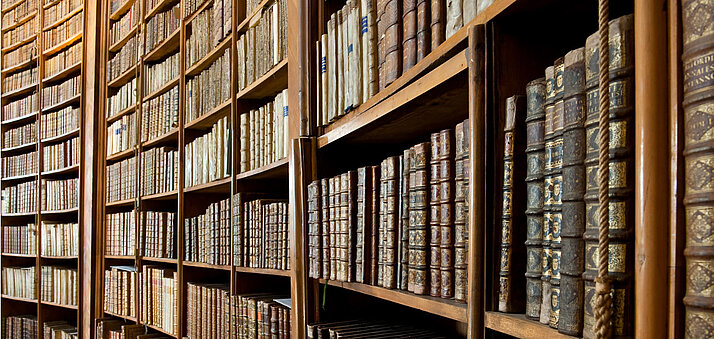Annual maintenance work will take place again this summer, which is why the reading rooms at the Heldenplatz location and in all collections will be closed from Friday, July 25, to Tuesday, August 5, 2025.
Due to the shutdown of the ordering system, no media orders can be accepted from Thursday, July 24, 2025, 4 p.m. to Tuesday, August 5, 2025, 4 p.m. The regular opening hours will then apply again from Wednesday, August 6, 2025.
The study room of the Albertina is closed from July 15 to August 15. During this time (except July 25 to August 5), media ordered from the Albertina collection will be transported twice a week (Monday and Thursday) to the reading rooms of the National Library on Heldenplatz and can be used there.
Starting August 1, 2025, the State Hall will open at 9 a.m.
Due to an event, the State Hall will be closed on August 4, 2025.
Holdings of the Department of Music
Whether you are looking for music manuscripts, music prints, sound recordings, books or bequests, simply search online in our Catalogue QuickSearch.
Our collections at a glance
Music manuscripts
Our music manuscripts (about 60,000) constitute our historically most important collection:
- Original manuscripts by Joseph Haydn, Wolfgang Amadeus Mozart, Ludwig van Beethoven, Franz Schubert, Anton Bruckner, Richard Strauss, Alban Berg and many others
- Choir books from the 15th to 17th centuries
- Sheet music from the Viennese Court Orchestra and numerous Viennese theatres and opera houses
- Music collections from the emperors Leopold I, Charles VI and Francis I
Music prints
The music prints (about 130,000) mainly tell the Austrian history of music. The Department of Music therefore serves as a central Austrian music archive.
Librettos
The collection of librettos (about 8,000) is a source of information about musical theatre, past and present – especially about opera in the baroque period.
Secondary literature
A specific section of the book collection of the Austrian National Library contains literature focusing on music (about 80,000 volumes).
Legacies
The Department of Music looks after the bequests of composers and performers, and other archival material. The bequests from Anton Bruckner, Hugo Wolf, Alban Berg, Franz Schreker, Hans Pfitzner, Clemens Krauss and others are particularly important.
Sound recordings
The sound recordings (about 18,000 records and compact discs, about 4,000 tapes) mainly document the history of Austrian music.
Photogram Archive
The Photogram Archive (about 60,000 sheets) allows researchers to study original manuscripts that are not owned by the Department of Music. These holdings cannot be found in our online catalogue, but are indexed in a printed catalogue.

